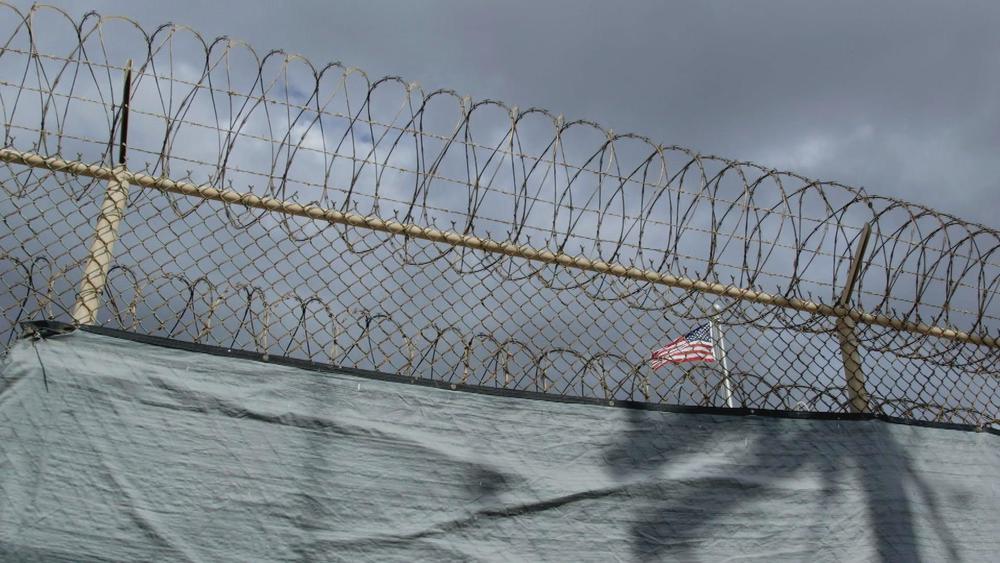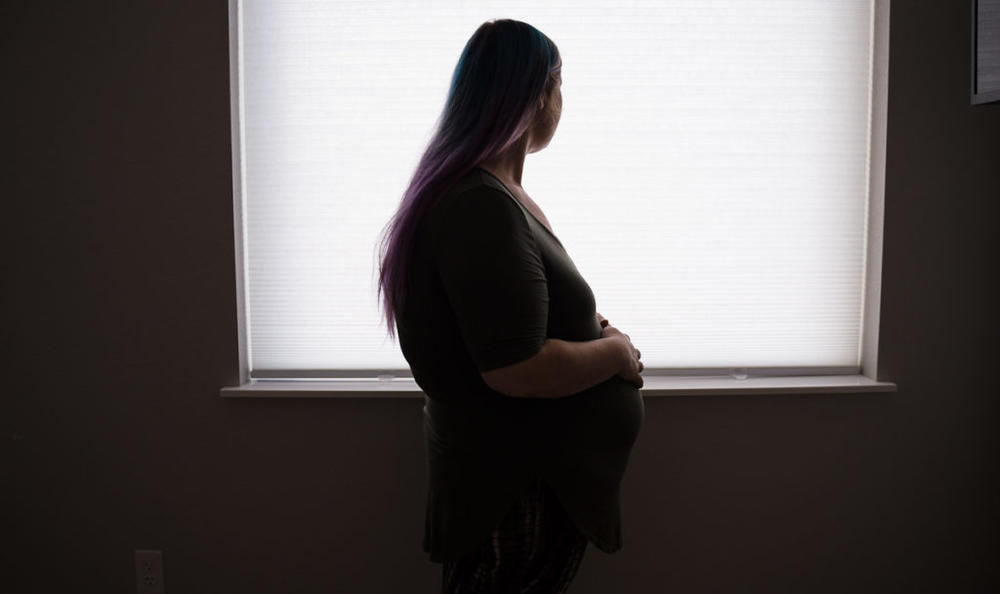
Section Branding
Header Content
Georgia Today: Tybee lighthouse temp. closure; First responder legislation; Postpartum medication
Primary Content
On the Wednesday, Dec. 27 edition of Georgia Today: One of Georgia's oldest and tallest lighthouse is set to close for three months; a police officer pushes for legislation that could help first responders with PTSD; and doctors in Georgia can now prescribe a new medication for postpartum depression.

Peter Biello: Welcome to the Georgia Today podcast from GPB News. Today is Wednesday, Dec. 27. I'm Peter Biello. On today's episode, one of Georgia's oldest and tallest lighthouses is set to close for three months. A police officer pushes for legislation that could help first responders with PTSD. And doctors in Georgia can now prescribe a new medication for postpartum depression. All this and more is coming up on this edition of Georgia Today.
Story 1:
Peter Biello: Georgia's oldest and tallest lighthouse is set to close for about three months. GPB's Orlando Montoya reports, The Tybee Island Lighthouse is undergoing its first major renovation in about 24 years.
Orlando Montoya: At two-and-a-half centuries old, the lighthouse gets a fix-up on a regular basis every few years, in fact. But Sarah Jones of the Tybee Island Historical Society says the latest upgrades revealed some expensive surprises.
Sarah Jones: So it started out as a paint job and then it grew. And it grew because we couldn't figure out what was causing that mark on the side of the lighthouse that just kept reappearing and reappearing.
Orlando Montoya: That discoloration was coming from hard to fix leaks. Renovations could top $1.8 million, the lighthouse's has costliest repairs since 1999. Its museum and outbuildings will remain open while the tower will be off-limits through mid-March. For GPB News, I'm Orlando Montoya.

Story 2:
Peter Biello: Another man has died in Central State prison, bringing the total deaths in the Macon facility this month to three. 66-year-old Joseph Akins was found dead Monday morning from unknown causes. That's according to Bibb County coroner Leon James. An autopsy is planned. Earlier this month, two men died in two days from separate stabbings at the prison. Officials did not say whether the two stabbings were connected to Akins' death or to each other. Activists say short staffing and gang activity has contributed to a rise in deaths in Georgia state prisons over the past several years.
Story 3:
Peter Biello: The Atlanta Opera has reached Budget One status because of its expanded programs and performances, making it one of the top 10 operas in the nation. GPB's Amanda Andrews has more.
Amanda Andrews: The Atlanta Opera has been elevated to Budget One by reaching a $15 million operations budget ahead of the 2024-2025 season. The change is due to steady growth in ticket sales, audience engagement and fundraising. Opera artistic director Tomer Zvulun says the status is nice, but he's most proud of the opera community.
Tomer Zvulun: What's really unique about the spirit of the people is this indomitable striving for excellence, for putting on the best show ever every time, despite all the obstacles that the world constantly brings us — may be a pandemic, may be a war or may be a recession.
Amanda Andrews: The Atlanta Opera celebrates its 45th anniversary next year. The lineup for the next season of the opera will be announced in January. For GPB News, I'm Amanda Andrews.
Story 4:
Peter Biello: As we wind down 2023, we're bringing you some of our newsroom's reporting highlights. And today, we bring you this story about federally funded summer meal programs like the one run by the Bibb County School District in Macon that step in to fill the gap during some of the hardest months for families that are food-insecure. GPB's Sofi Gratas reports.
Sofi Gratas: It’s lunch time for the kids at Macon’s Martin Luther King Elementary School.
AMBIENT SOUND: Children
LaTanya Wooten My name is Latanya Wooten. And I am the nutrition manager here at the Dr. Martin Luther King Elementary School
Sofi Gratas: This summer, Wooten's been feeding kids enrolled in the school district’s summer camp and kids from the neighborhood, who are hungry.
LaTanya Wooten: it's a program that's much needed. It's much needed, you know. A lot of parents work like in the morning time and in the afternoon. So by us feeding the kids, they don't have to worry about whether or not their child is eating, especially if they don't have, like, older siblings or something like that.
AMBIENT SOUND: Children gathering and talking.
LaTanya Wooten: With us, we know that they will get either a lunch and/or a breakfast.
Sofi Gratas: Condus Shuman is the executive director of School Nutrition for the district.
Condus Shuman: It doesn't matter whether or not you're a Bibb County student. So if you're visiting Grandma and Grandpa for the summertime and they live in Bibb, you have access to these meals every day. And even if they're not in school, that's the whole purpose of the mobile site so that we'll bring the food to you.
AMBIENT SOUND: Parking lot
Sofi Gratas: Which takes us to a parking lot in North Macon. Site coordinator Keiza Hunt gets ready to send off school buses filled with lunch bags for kids.
AMBIENT SOUND: School buses
Kieza Hunt: Load them up in these bags and we call these — they're like cooler bags. So it keeps hot food hot and cold food cold. I know here at the Central Kitchen each day we've been packing anywhere from 1,800 to 2,300 meals.
Sofi Gratas: Meals on this bus are going to four neighborhoods in town, where Sheena Hartry hands them out.
AMBIENT SOUND: School buses
Sofi Gratas: Hartry hustles kids in and out of the bus. Some are so young they need help walking. When the bus stops at a neighborhood in East Macon, Michelle Harris walks out with her five grandkids.
Michelle Harris: I come every day. They love it. Maybe, um, some applesauce be in there and stuff like that.
Child: Yeah. Milk!
Michelle Harris: And milk.
Sofi Gratas: This is the last week for the mobile food program. So what will Michelle and her grandkids do next?
Michelle Harris: Pray. (Laughs) We're gonna feed them, I mean, but it's hard.
Child: It stops on Friday.
Michelle Harris: With food being so high right now and they're home all day long.
Sofi Gratas: At the last bus stop, some kids take their lunch inside the Anthony Homes Community Center. Shavez Adams looks after them.
Shavez Adams: Each day they come in, I make sure they have games as well as some kind of activity, even if it is math, learning, reading, something like that in that nature to try to get them stimulated and not only just have them come down and just eat lunch. Who wants to do that?
Sofi Gratas: Shavez says some kids stay here through the evening. He’s worried what an end to the summer meal program will mean for them.
Shavez Adams: They could have extended it. They should extend it to at least towards the end of the summer compared to just one month. Then, because some kids do depend on it. And I don't want to just go into detail on that, but I know kids do depend on it sometimes. So that would be my only gripe about the situation. But for the most part, like I said, I'll be trying to actually show the kids that they can come in and have fun and learn and eat and be in an environment where they are not stagnated.
Sofi Gratas: By now, the school district’s summer meal program is mostly over. It’s around the same time that local nonprofits step up to help feed hungry kids while families wait another month for school and school meals to start again. For GPB News, I’m Sofi Gratas in Macon.

Story 5:
Peter Biello: Sports betting has spread rapidly across the U.S. in the past five years, but it remains illegal in Georgia. Now lobbyists are expected to make a well-funded push for it in the next legislative session. Republican Gov. Brian Kemp has expressed an openness to legalizing sports betting. But the effort stalled this past year when the Senate rejected a proposed constitutional amendment that would have let voters decide the issue. In addition to Georgia, sports betting is illegal in Alabama, Alaska, California, Hawaii, Idaho, Minnesota, Missouri, Oklahoma, South Carolina, Texas and Utah.

Story 6:
Peter Biello: For the first time, doctors in Georgia can prescribe an oral treatment that works faster than anything previously available for postpartum depression. Earlier this year, the U.S. Food and Drug Administration approved zuranolone, and it's now commercially available. GPB's Ellen Eldridge reports.
Ellen Eldridge: As many as 4 out of 5 women experienced so-called baby blues in the weeks following birth. But postpartum depression is a psychiatric issue that often goes unrecognized. Dr. Toby Goldsmith is an assistant professor at the Emory University School of Medicine. She says a new medication zuranolone works differently than traditional antidepressants like Prozac.
Dr. Toby Goldsmith: Patients start seeing a difference within as little as three days — while it's frequent, when our patients are on SSRIs, they often have to wait a matter of weeks, maybe even months, before they get a significant benefit.
Ellen Eldridge: Goldsmith says zuranolone is one of numerous options, and what is important is getting help. For GPB News, I'm Ellen Eldridge.
Story 7:
Peter Biello: If you're a first responder in Georgia diagnosed with PTSD, you can get worker's compensation only if you have a corresponding physical injury. For example, if you're a police officer shot in the line of duty and you develop PTSD, you're covered. But if you witness another officer's murder, you're not. That's what happened to Gwinnett County Police Officer Ashley Wilson, who struggled to get treatment for PTSD after her partner was shot and killed in 2018. She's now lobbying for legislation that would create an insurance program for situations like hers. She's with me now. Thank you very much for speaking with me.
Ashley Wilson: I'm so glad to be here.
Peter Biello: So this bill would help pay for therapy, which may otherwise be out-of-pocket for first responders. It also would provide three years of partial salary protection if a first responder needs time away from their job to heal. When you saw your partner killed in the line of duty in 2018, how would the aftermath have been different for you had this bill been law back then?
Ashley Wilson: I think what this bill does is recognize post-traumatic stress disorder. It takes all the stigma out of the conversation. I feel like, in my scenario, that I was all alone: that I didn't have — I couldn't tell anybody because everybody else looked like they were doing okay. How was I the only one who was having these flashbacks or having nightmares and not being able to sleep? And so it really kept me in that shame and guilt that I didn't share with other people. What this does is I hope it opens up the conversation that there is help. I think if this bill would have been around, I would have sought care a lot sooner.

Peter Biello: Could you tell us about the kind of treatment that you received after the incident?
Ashley Wilson: I was really thankful when a supervisor intervened and was like, "I know you. I recognize you. Like, this is not okay" and set me up with a really great trauma-informed therapist. Our brains are not meant to see some of the horrible stuff that first responders see every day. And so not only was I able to go through this traumatic incident, really find rock bottom and then start therapy, I was able to come out of therapy a better police officer. I was able to go back to doing this job of a guardian of my community so much better.
Peter Biello: I imagine without this benefit that you are now advocating for, it could be pretty expensive.
Ashley Wilson: At the end of my treatment, I was about $20,000 in out-of-pocket expenses.
Peter Biello: Mm hmm.
Ashley Wilson: So this this bill would really go a long ways to helping first responders receive care and not end up having to decide, "do I pay for my house or do I pay for therapy?"
Peter Biello: What does this say about the mental health of police and first responders right now? Are there, in your estimation, a substantial number of these workers who are persisting in spite of intolerable mental anguish because they're afraid to bring it up or because they feel like they don't have the resources to get treatment?
Ashley Wilson: Oh, absolutely. Right now, And it has been for the past five to, really, seven years that I've done research on that, first responders are more likely to die by suicide than they are to be feloniously killed in the line of duty. I belong to a peer support team for my police department, and that's really kind of gives me a behind-the-curtain view of people who are really struggling and need somebody to talk to. They need some help. They have these on the fire side, but some departments don't. Some departments don't have any resources for their first responders within the community. And unfortunately, because those resources are so, so few and far between, we see these astronomical suicide rates.
Peter Biello: You said you get some pushback on this in the previous attempts to get this legislation through. What was that pushback like?
Ashley Wilson: A lot of the arguments in our first couple of years of this was going through worker's compensation. Worker's compensation is kind of meant to be adversarial at times, and there's no confidentiality with it. It also — it was extremely expensive. So that's how we shifted our focus from having a worker's compensation model to having a supplemental insurance model. So we went from something that could have cost $34,000 under worker's compensation to now it'll cost about what it cost to give us a uniform per year, per first responder.
Peter Biello: Is there anything about the political winds this year that you think make this year the year it passes?
Ashley Wilson: The foundation that House Bill 1013, the mental health and parity bill that was passed last year, sets a really great foundation for the importance of mental health. And now we've really had great support on both sides of the aisle. And I think this year we're going to be able to get it through committee and to a vote on both sides.
Peter Biello: Well, Ashley Wilson, thank you so much for speaking with me about this. I really do appreciate it.
Ashley Wilson: Thank you, sir.
Peter Biello: If you or someone you know needs help, the suicide and crisis lifeline is 988.
And that is it for this edition of Georgia Today. If you want to learn more about any of these stories, visit our website, GPB.org/news. And take a moment to subscribe to this podcast. We plan on being right back in your podcast feed tomorrow afternoon, and we wouldn't want you to miss a thing. If you've got feedback, we would love to hear from you. Send us an email. The address is GeorgiaToday@GPB.org. We take story ideas as well. Again, GeorgiaToday@GPB.org. I'm Peter Biello. Thank you again for listening. I'll see you tomorrow.
---
For more on these stories and more, go to GPB.org/news



